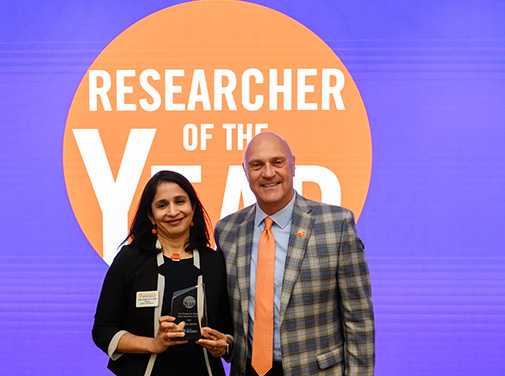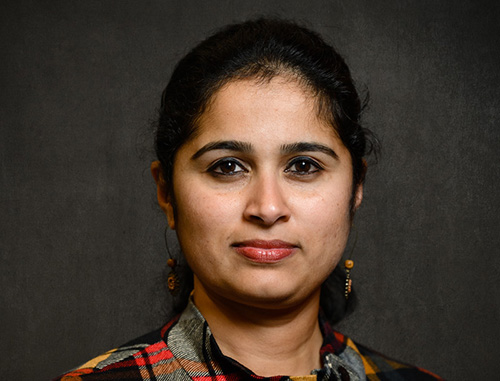
Jody Cripps
Associate Professor
Languages
College of Arts and Humanities
The Researcher of the Year awards recognize the efforts of high-achieving faculty whose work is improving society through the generation and dissemination of new knowledge. Each college nominates one senior faculty member and one junior faculty member who received their terminal degree within the past 10 years.
Nominations are reviewed by an interdisciplinary committee, and winners were announced by President Clements at the annual Research Symposium held on May 7, 2025, at the Watt Family Innovation Center.
Meet the winners and nominees for 2025 Clemson University Researcher of the Year.
Anjali Joseph
Spartanburg Regional Health System Endowed Chair in Architecture + Health Design / Director, Center for Health Facilities Design & Testing / Professor
School of Architecture
College of Architecture, Art and Construction
 Joseph’s research focuses on helping health care systems improve patient safety by reimagining and redesigning facilities that are more efficient and less stressful for providers, leading directly to improved patient outcomes. It has been supported by numerous federal agencies, foundations and industry, which is putting her work to good use. Her research on operating room design, for example, led to the development of a prototype OR now implemented in ambulatory surgery centers nationwide. This spring, her team earned a national award for work on the design and evaluation of new patient rooms for Indiana University Health’s new hospital in downtown Indianapolis. Joseph has earned numerous national recognitions for her work and was twice named among the 25 most influential people by Healthcare Design Magazine.
Joseph’s research focuses on helping health care systems improve patient safety by reimagining and redesigning facilities that are more efficient and less stressful for providers, leading directly to improved patient outcomes. It has been supported by numerous federal agencies, foundations and industry, which is putting her work to good use. Her research on operating room design, for example, led to the development of a prototype OR now implemented in ambulatory surgery centers nationwide. This spring, her team earned a national award for work on the design and evaluation of new patient rooms for Indiana University Health’s new hospital in downtown Indianapolis. Joseph has earned numerous national recognitions for her work and was twice named among the 25 most influential people by Healthcare Design Magazine.
Sruthi Narayanan
Associate Professor of Crop Ecophysiology
Plant and Environmental Sciences Department
College of Agriculture, Forestry and Life Sciences
 Narayanan’s research focuses on unraveling the resilience mechanisms agronomic crops use to manage abiotic stress from heat, drought and other climate conditions. This work supports the development of crop varieties that are environmentally sustainable, heat- and drought-tolerant and profitable for growers. She has received support from federal and state agencies, as well as industry collaborators, and mentored numerous visiting scientists, postdoctoral research associates and graduate, undergraduate and high school students in South Carolina. Narayanan has quickly garnered national recognition in her field, being elected to serve in multiple leadership roles within professional societies. Currently, she is the chair-elect of the Crop Physiology and Metabolism Division of the Crop Science Society of America. Among several national awards, Narayanan received the prestigious Crop Science Society of America Early Career Award in 2021.
Narayanan’s research focuses on unraveling the resilience mechanisms agronomic crops use to manage abiotic stress from heat, drought and other climate conditions. This work supports the development of crop varieties that are environmentally sustainable, heat- and drought-tolerant and profitable for growers. She has received support from federal and state agencies, as well as industry collaborators, and mentored numerous visiting scientists, postdoctoral research associates and graduate, undergraduate and high school students in South Carolina. Narayanan has quickly garnered national recognition in her field, being elected to serve in multiple leadership roles within professional societies. Currently, she is the chair-elect of the Crop Physiology and Metabolism Division of the Crop Science Society of America. Among several national awards, Narayanan received the prestigious Crop Science Society of America Early Career Award in 2021.

Jody Cripps
Associate Professor
Languages
College of Arts and Humanities

Adam Hoover
Associate Department Chair
Electrical and Computer Engineering
College of Engineering, Computing and Applied Sciences

Anjali Joseph
Spartanburg Regional Health System Endowed Chair
Architecture + Health Design
College of Architecture, Art and Construction

William Kettinger
William S. Lee Distinguished Professor
Management
Wilbur O. and Ann Powers College of Business

Darris Means
Professor
Educational and Organizational Leadership Development
College of Education

Sourav Saha
Professor
Chemistry
College of Science

Guido Schnabel
Professor
Plant and Environmental Sciences
College of Agriculture, Forestry and Life Sciences

Heidi Zinzow
Professor
Psychology
College of Behavioral, Social and Health Sciences

Kristen Duncan
Assistant Professor
Teaching and Learning
College of Education

Casey Hopkins
Assistant Professor
Nursing
College of Behavioral, Social and Health Sciences

Matthew Koski
Assistant Professor
Biological Sciences
College of Science

Shunyu Liu
Assistant Professor
Automotive Engineering
College of Engineering, Computing and Applied Sciences

Jiahui Mo
Assistant Professor
Management
Wilbur O. and Ann Powers College of Business

Sruthi Narayanan
Associate Professor
Plant and Environmental Sciences
College of Agriculture, Forestry and Life Sciences

Vivek Sharma
Assistant Professor
Nieri Department of Construction and Real Estate Development
College of Architecture, Art and Construction

John Thames
Assistant Professor
Philosophy and Religion
College of Arts and Humanities